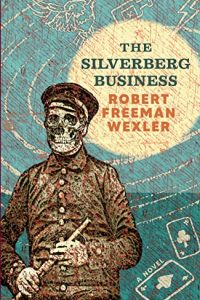Gary K. Wolfe Reviews Red Team Blues by Cory Doctorow
 Red Team Blues, Cory Doctorow (Tor 978-1-250-86584-7, $27.99, 216pp, hc) April 2023.
Red Team Blues, Cory Doctorow (Tor 978-1-250-86584-7, $27.99, 216pp, hc) April 2023.
The first thing to be said about Cory Doctorow’s Red Team Blues is that it’s SF only in the sense that it deals with razor-edge technologies like cryptocurrencies, blockchains, secure enclaves, and other issues that Doctorow clearly understands far better than I do. As with midcareer William Gibson (and some of Doctorow’s own earlier novels), the line between contemporary fiction and near-term speculation is so permeable that the future might as well have happened last Tuesday. In terms of genre, Red Team Blues firmly positions itself in the tradition of hardboiled detective stories and is apparently the first of a series featuring the cynical but super competent loner Martin Hench. But while Hench may share some mean streets with Philip Marlowe, Sam Spade, or Spenser, he’s also an unusual choice for a hardboiled hero: a 67-year-old forensic accountant and Silicon Valley veteran who specializes in tracking down information and money through the labyrinthine trickery available in the crypto era. He also lives in a luxurious tour bus that once belonged to a rock star and, unlike those private eyes who go all soft-hearted when it’s time to charge fees, he makes sure he collects the payouts that keep him wealthy.
When an old friend who has developed a new kind of cryptocurrency manages to lose security keys that could be worth billions of dollars – and which have made him the target of powerful and lethal forces – Hench reluctantly agrees to take the case, and soon finds himself a target as well. Combining his accounting wizardry with some very old-fashioned street-level gumshoe work, he discovers a brutal triple murder, one of whose victims make him the target of a yet another powerful nemesis. Fortunately (and predictably), he’s able to enlist the aid of loyal friends – all brilliant women – including a retired Silicon Valley executive, a groundbreaking economist, and the young wife of the cryptocurrency client. While his elaborate efforts to protect himself and clear his name involve some shady near-blackmail and even a brief period of homelessness, for the most part he avoids the sort of tough-guy confrontations that might have characterized his literary forbears, but that don’t make much sense for a 67-year-old. In other words, Red Team Blues seems fresh not only because of its unusual choice of an older protagonist, but because it treats his age with credibility and respect.
Along the way, of course, we gain a good deal of perspective on the world Hench inhabits. In many ways, Doctorow is about as far as you could get from an old-school SF writer like Asimov, but they have one thing in common: both are master explainers, and both love peppering their fiction with insights which can be as compelling as the story itself. Only a few pages into Hench’s meeting with his beleaguered client, we get quick lessons on the importance of proof of work in blockchains, the enormous carbon costs of cryptocurrencies, and why any device like an iPhone with a secure enclave ‘‘is a device that treats its owner as the enemy,’’ to be continually outsmarted. For that matter, when Hench whips together a steak meal for himself, he virtually gives us the recipe, like Parker’s Spenser, and when he briefly finds himself ‘‘slumming it’’ in ‘‘the vast, invisible country of San Francisco’s homeless camps,’’ we learn a bit about the economics of that culture. None of this slows down Doctorow’s efficient and twisty plot, which does full justice to the noir tradition. Supposedly the next volumes will take us back to earlier stages of Hench’s career, and he’s an interesting and complex enough character, with some equally interesting pals, that I’d be delighted to follow along and see where he came from.
Gary K. Wolfe is Emeritus Professor of Humanities at Roosevelt University and a reviewer for Locus magazine since 1991. His reviews have been collected in Soundings (BSFA Award 2006; Hugo nominee), Bearings (Hugo nominee 2011), and Sightings (2011), and his Evaporating Genres: Essays on Fantastic Literature (Wesleyan) received the Locus Award in 2012. Earlier books include The Known and the Unknown: The Iconography of Science Fiction (Eaton Award, 1981), Harlan Ellison: The Edge of Forever (with Ellen Weil, 2002), and David Lindsay (1982). For the Library of America, he edited American Science Fiction: Nine Classic Novels of the 1950s in 2012, with a similar set for the 1960s forthcoming. He has received the Pilgrim Award from the Science Fiction Research Association, the Distinguished Scholarship Award from the International Association for the Fantastic in the Arts, and a Special World Fantasy Award for criticism. His 24-lecture series How Great Science Fiction Works appeared from The Great Courses in 2016. He has received six Hugo nominations, two for his reviews collections and four for The Coode Street Podcast, which he has co-hosted with Jonathan Strahan for more than 300 episodes. He lives in Chicago.
This review and more like it in the July 2023 issue of Locus.
 While you are here, please take a moment to support Locus with a one-time or recurring donation. We rely on reader donations to keep the magazine and site going, and would like to keep the site paywall free, but WE NEED YOUR FINANCIAL SUPPORT to continue quality coverage of the science fiction and fantasy field.
While you are here, please take a moment to support Locus with a one-time or recurring donation. We rely on reader donations to keep the magazine and site going, and would like to keep the site paywall free, but WE NEED YOUR FINANCIAL SUPPORT to continue quality coverage of the science fiction and fantasy field.
©Locus Magazine. Copyrighted material may not be republished without permission of LSFF.








